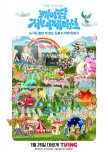So much more than just the music
This documentary series describes the K-Pop industry from the inside through interviews with the professionals embedded within it. So they tell the story they want us to hear it and it is how they tell it to themselves. It is not designed to be an exposé, so don’t expect it to poke the vulnerable underbelly. K-Pop from the outside in gets an airing in Ep 6 but it was the least interesting episode and opportunities for insightful constructive critique were largely missed. Having said that, it is a serious piece of work that is thoughtfully structured, clearly developed and well worth watching.
I first got introduced to K-Pop about four years ago, so for me this was an interesting and informative series that provoked a lot of thought. As a long-time consumer of so-called western music and the business models and culture around it, it was really helpful to get an insight like this and confirmed that you cannot look at K-Pop through a western lens, it has to be understood on its own terms. Believe me, Stock Aitken Waterman were just rugrats fumbling with Duplo compared to their contemporary, Lee Soo Man, when he set up SM Entertainment and began conceptualising and building on a Lego Masters scale.
The series reflects on every aspect of the business of K-Pop and the culture it has spawned and is embedded in. From its history to the current world of fandom, how the music is composed, the choreography designed, the idols trained. It explores the clever exploitation of the market and the development of globalisation and how that impacts and changes the domestic market and attitudes. In the final episode it opens windows onto the future and K-Pop’s place in the wider context of a world uniting through digital technology.
The impact of COVID created opportunities for agencies in the sphere of digital marketing and digital creativity. They systematically exploited them to find ways of “connecting to each other directly…that people kind of enter this K-Pop universe that they can experience and enjoy. It’s almost like an immersive metaverse but in real life.” This technological revolution is blurring the distinctions between fans and idols and pushing it down the road of the illusion of a special and “private” reality that includes AI video-game inspired group members. But it is also opening up possibilities for creating like-minded global politico-social action groups that look outwards into the real world to effect change. As one interviewee says “K-Pop agencies are actively leading the industry beyond music”.
The mental pressure on everyone, but particularly the performers, is mentioned fleetingly in Ep 3, but the response (from a sunbae idol) was to push yourself harder. The ethic of always working harder to be better and attain perfection, which is a deliberate selection criteria subsequently nurtured by the agencies, also means that they are selecting for certain types of mental health issues. As was explicitly stated in the documentary, you need to have a certain personality type to survive in this industry. Watching this soon after the tragic death of Moon Bin was particularly poignant and the failure to address this elephant in the room was a glaring shortcoming in the series.
The series provides a great deal to reflect on in terms of how music relates to and reflects the current needs and dreams of society. And how the fundamental nature of business to exploit opportunities for gain has shaped and continues to shape and expand the music industry.
I first got introduced to K-Pop about four years ago, so for me this was an interesting and informative series that provoked a lot of thought. As a long-time consumer of so-called western music and the business models and culture around it, it was really helpful to get an insight like this and confirmed that you cannot look at K-Pop through a western lens, it has to be understood on its own terms. Believe me, Stock Aitken Waterman were just rugrats fumbling with Duplo compared to their contemporary, Lee Soo Man, when he set up SM Entertainment and began conceptualising and building on a Lego Masters scale.
The series reflects on every aspect of the business of K-Pop and the culture it has spawned and is embedded in. From its history to the current world of fandom, how the music is composed, the choreography designed, the idols trained. It explores the clever exploitation of the market and the development of globalisation and how that impacts and changes the domestic market and attitudes. In the final episode it opens windows onto the future and K-Pop’s place in the wider context of a world uniting through digital technology.
The impact of COVID created opportunities for agencies in the sphere of digital marketing and digital creativity. They systematically exploited them to find ways of “connecting to each other directly…that people kind of enter this K-Pop universe that they can experience and enjoy. It’s almost like an immersive metaverse but in real life.” This technological revolution is blurring the distinctions between fans and idols and pushing it down the road of the illusion of a special and “private” reality that includes AI video-game inspired group members. But it is also opening up possibilities for creating like-minded global politico-social action groups that look outwards into the real world to effect change. As one interviewee says “K-Pop agencies are actively leading the industry beyond music”.
The mental pressure on everyone, but particularly the performers, is mentioned fleetingly in Ep 3, but the response (from a sunbae idol) was to push yourself harder. The ethic of always working harder to be better and attain perfection, which is a deliberate selection criteria subsequently nurtured by the agencies, also means that they are selecting for certain types of mental health issues. As was explicitly stated in the documentary, you need to have a certain personality type to survive in this industry. Watching this soon after the tragic death of Moon Bin was particularly poignant and the failure to address this elephant in the room was a glaring shortcoming in the series.
The series provides a great deal to reflect on in terms of how music relates to and reflects the current needs and dreams of society. And how the fundamental nature of business to exploit opportunities for gain has shaped and continues to shape and expand the music industry.
Vond je deze recentie nuttig?


 3
3 2
2

















